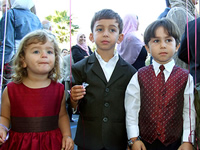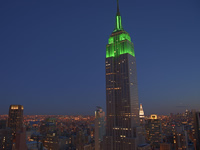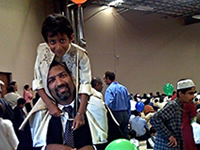 Why is it that Eid is a three-day affair? Perhaps it is because Muslims (despite their best efforts) end up celebrating it on different days. For those Muslims who follow the lead of Saudi Arabia (as some of the more conservative mosques do), the Eid celebration is today. However, for most Muslims in America who follow either the calculation or the moon sighting methods, Eid is tomorrow, on Saturday. A weekend Eid is something special — we don’t have to take time out of work or pull our kids out of school for the day — and I intend to make the most of it.
Why is it that Eid is a three-day affair? Perhaps it is because Muslims (despite their best efforts) end up celebrating it on different days. For those Muslims who follow the lead of Saudi Arabia (as some of the more conservative mosques do), the Eid celebration is today. However, for most Muslims in America who follow either the calculation or the moon sighting methods, Eid is tomorrow, on Saturday. A weekend Eid is something special — we don’t have to take time out of work or pull our kids out of school for the day — and I intend to make the most of it.
If you’re not used to seeing Muslims, Eid is the day where you are most likely to see groups of them. Unfortunately (and we’re working on this), it will probably be because the parking situation around the location of Eid prayer is horrific, or because all the cabs seem to have disappeared off the streets. With the Muslim population in America growing as fast as it is, the average mosque is not big enough to accommodate all the worshippers, so larger venues are booked, often with many local mosque communities joining forces.
I’ve been to Eid services in convention centers, football and basketball stadiums, concert halls, and large city parks. Despite the larger size of the venue, multiple prayers (usually at 8 am and 10 am) are needed. Even in small towns, thousands of Muslims show up, because many otherwise non-observant Muslims show up for Eid. Here in Austin, we expect around 10,000 worshippers, and I’ve been to prayers in larger cities where the numbers approach 75,000. You’ll probably see footage of your local Eid celebrations on the evening news.
It’s quite a sight to see, especially with everyone dressed in their finest clothes. Many men are dressed in suits and ties, or the ethnic dress of their countries of origin. Women are adorned with every color of the rainbow, and all are sitting in well-organized rows facing Mecca. The service itself is a simple one – two short cycles of prayer, followed by an Eid sermon (khutbah), and that’s it. Obligatory charitable donations (zakat) are due sometime before the prayer starts.
One of the most unique and beautiful things about the Eid prayer is the Eid takbir, or praise of God, which occurs as people gather and wait for the prayer to begin. It is the closest thing you’ll find to congregational singing in Muslim religious practice. Congregants are handed sheets of paper with translations/transliterations so they can follow along, and everyone is encouraged to chant in unison. After the prayer, there is a lot of hugging, catching up, and distributing gifts to children, followed by something that now seems very strange: breakfast by daylight. The remainder of the day is filled with Eid parties and carnivals held throughout the city.
Let me take this moment to wish all of you Eid mubarak (happy Eid). If you really want to make your Muslim neighbor’s day, give them the gift of the Eid mubarak greeting. They may not expect it, but trust me — they will be very grateful.

